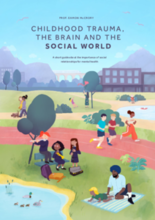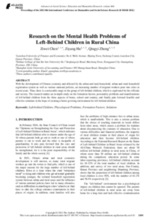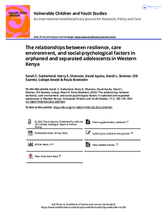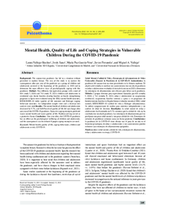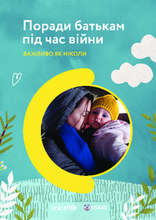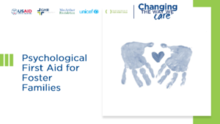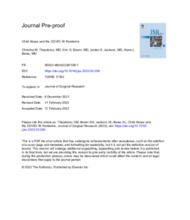Displaying 51 - 60 of 525
This guide aims to share some of the latest research findings with those who are working every day to support children who have experienced complex trauma in the form of maltreatment.
This study analyzes the influence of school, family and society on the psychological development of left-behind children in China from the perspective of the factors that affect their psychological problems.
This study found a strong relationship between the care environment and resilience in orphaned and separated adolescents and youths (OSAY) in western Kenya. Care environment and resilience each independently demonstrated strong relationships with peer support, social support, and participating in volunteer activities. Resilience also had a strong relationship with familial support. These data suggest that resilience can be developed through strategic supports to this vulnerable population.
The aim of this study is to analyse the consequences after one year of the pandemic on a group of children and adolescents assessed at the beginning of the pandemic in 2020 and to determine the most effective ways of psychologically coping with this pandemic.
In the brochure, you will find the basic rules of safety, hygiene, nutrition, vaccination, psychological support - the answers to the questions that are currently most relevant are collected in one material prepared by UNICEF with the support of the United States Agency for International Development (USAID).
This rapid training was designed to provide information to Moldovan foster families in preparation for fostering unaccompanied and separated children from the Ukraine. The training package includes a PPT and facilitator’s guide. Content provided during the six-hour training program includes basic information on childhood trauma, Adverse Childhood Experiences, key elements of PFA including Look, Listen and Link, and understanding how to both identify and support children who have lived through trauma and how it might manifest at different ages and stages of development.
Separation and loss characterise a child’s experience in care, yet losses in the care-experienced population have rarely been studied as a possible source of trauma or as events that may justify a grief response. A literature search of five databases yielded 592 publications. 41 full text articles were reviewed, 16 publications were included. Thematic analysis revealed: children in care are affected by two broad type of ambiguous loss, relationship losses and psychosocial losses; behaviours labelled as ‘problem’ behaviours may in fact be indicators of the manifestations of ambiguous loss and disenfranchised grief; manifold ambiguous losses associated with multiple placement moves has a cumulative effect that can generate long-term negative consequences; the effects of ambiguous loss can be offset by supporting children in care to understand that their losses may not be resolvable, to build tolerance to this ambiguity, to rebuild their identity through forging permanent connections, and to make meaning of their situations.
It is starting to be recognised that young people with mental health and/or intellectual disabilities making the transition to adulthood from out-of-home care require focused attention to understand their needs and service requirements. Within the UK jurisdiction of Northern Ireland (NI), young people with mental health and/or intellectual disabilities are over-represented in the population of care leavers and yet very little is known about their specific needs. The overall aim of the study reported here was to examine the profile of care leavers with mental health and/or intellectual disabilities in order to better inform how best to configure child and adult service systems to meet their transitional needs.
The COVID-19 pandemic had widespread effects, including enhanced psychosocial stressors and stay-at-home orders which may be associated with higher rates of child abuse. The researchers aimed to evaluate rates of child abuse, neglect, and inadequate supervision during the COVID-19 pandemic.

